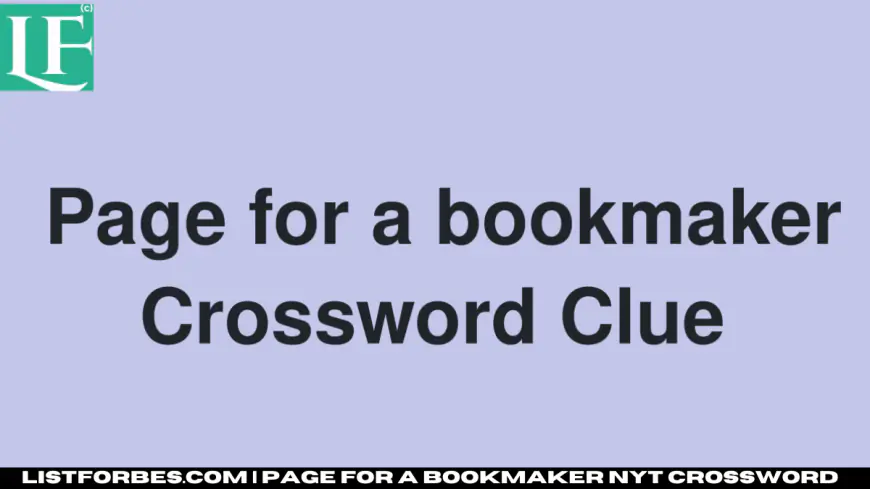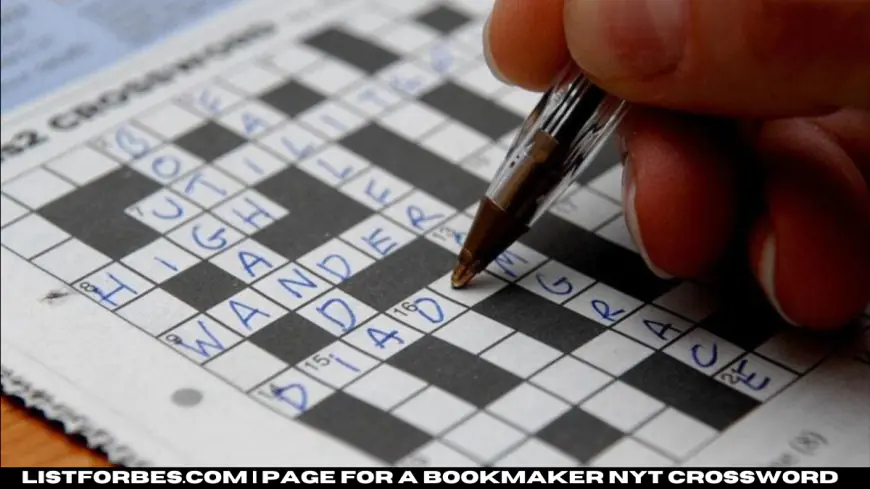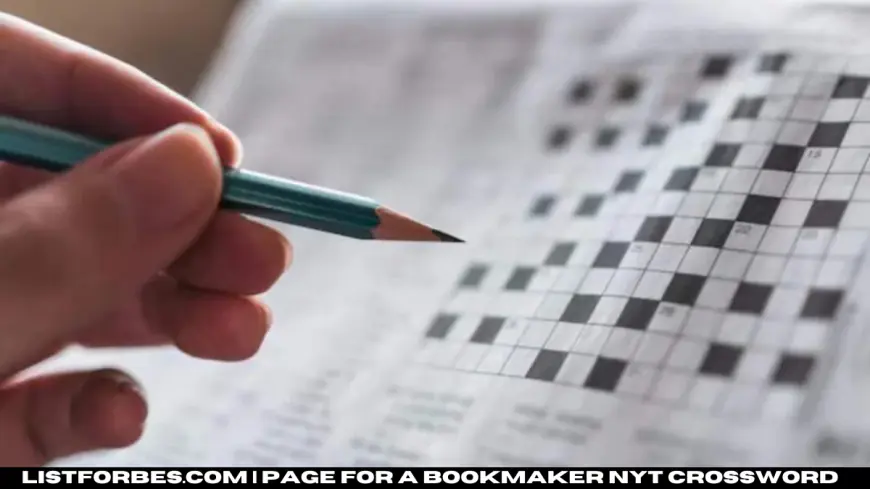How to Solve: The Page for a Bookmaker NYT Crossword
this companion is then to help. We’ll break down the strategies you can use to break not only this tricky indication but also others like it. Let’s dive into the world of crosswords, fastening on how to handle the indication "page for a bookmaker."

The New York Times (NYT) crossword mystification is a cherished diurnal challenge for numerous, offering a mix of entertainment and internal exercise. While crossword suckers love cracking the mystifications, occasionally suggestions can be downright perplexing, leading to hours of head-scraping. One similar grueling indication that has stumped numerous solvers is "page for a bookmaker." If you've come across this in the NYT crossword and you are looking for ways to approach working it.
Preface to Crossword mystifications
Crossword mystifications are word games where players are assigned to fill in a grid of places using suggestions to form words or expressions. The answers must fit the given number of places and cross with other answers grounded on participated letters. These mystifications range in difficulty from freshman-friendly to incredibly grueling, like those frequently set up in the New York Times, particularly as the week progresses (with Saturday generally being the hardest).
Crosswords test colorful aspects of knowledge, language, wordplay, culture, and occasionally indeed niche diligence. A successful solver will frequently combine general knowledge with specific mystification—working chops to work through each indication.
Understanding the NYT Crossword Style
The New York Times crossword mystification is known for its clever suggestions and subtle wordplay. The suggestions often incorporate puns, double meanings, and pop culture references, requiring solvers to think creatively. While some suggestions are straightforward, others, like “page for a bookmaker,” are more abstract and can be interpreted in different ways.
Before diving into specific strategies for working this indication, it’s helpful to understand many general tips for approaching NYT crossword notifications.
Crossword Language and Lingo Certain words and bowdlerizations frequently reoccur in crossword mystifications, and knowing them will give you an edge. Words like "period," "eel," and "Ale" appear constantly in mystifications.
The day matters. The difficulty of the New York Times crossword increases as the week progresses. Monday mystifications are generally the easiest, with more common words and straightforward suggestions. By Friday and Saturday, still, the mystifications are filled with tricky wordplay and obscure references.
Use of Wordplay Wordplay is a favorite trick of the NYT crossword generators. Suggestions can have double meanings, be homophones, or bear solvers to suppose a lower conventional interpretation of a word.
With these mystification characteristics in mind, let’s now concentrate on how to break the “page for a bookmaker” indication.

Breaking Down the Clue: "Page for a Bookmaker"
At first glance, the indication “page for a bookmaker” might feel confusing. There are two crucial rudiments: “page for a bookmaker.” Understanding what these words could mean in different surroundings is essential to working the mystification.
Understanding "page"
The word “page” has multiple meanings, which makes it a protean indication in crosswords. In some cases, it might relate to a physical page in a book. In others, it could indicate someone who works as a page, like a menial or adjunct. It could also relate to an internet webpage.
Then are a many different meanings of “page” that could apply to a crossword indication.
-
A distance of paper in a book or document.
-
An attendant or adjunct in certain diligence (e.g., a hostel page).
-
A webpage on the internet.
-
A signaling device or communication.
-
A boy in medieval times who served a knight.
What's "bookmaker"?
The alternate part of the indication "bookmaker" also has multiple meanings. A bookmaker can relate to someone who creates books, but in ultramodern operation, it most generally refers to a person or association that accepts and pays off bets, especially in sports gambling.
-
So "bookmaker" can mean
-
Someone who creates books.
A person or business involved in sports laying and laying (the more common ultramodern interpretation).
The significance of context
In crossword mystifications, suggestions frequently calculate on less egregious meanings of words to trick the solver. While a "page" might first bring to mind paper in a book and a "bookmaker" might feel like someone who creates books, it’s pivotal to suppose alternate meanings.
In this case, a "bookmaker" probably refers to someone who manages laying, and the "page" could be a commodity related to that assiduity. So, we’re not allowing books in the erudite sense, but further about laying, odds, and sports.
The Likely Answer: "Odds"
Given the below analysis, the indication “page for a bookmaker” is likely pertaining to a commodity central to the bookmaker's profession. In laying, the term “odds” is pivotal to a bookmaker’s work, as they're responsible for setting and calculating the odds for colorful issues in sports and other events.
Therefore, the answer to the crossword indication “page for a bookmaker” is most likely "odds.".
There’s why:
-
Bookmakers, who are involved in the laying world, work with odds to determine implicit payouts for bets.
-
A “page” in this environment isn't pertaining to a person or a distance of paper but rather a tropological term for a commodity a bookmaker might source or modernize, i.e., the “odds” page.
-
In a sports laying script, odds are generally displayed on a page or board that the bookmaker updates.

Strategies for working Crossword suggestions like this
Now that we’ve broken down the "page for a bookmaker" indication, let’s look at some general strategies for working tricky crossword suggestions.
Consider Multiple Meanings of Words
As demonstrated with the word "page," words can have several meanings. When you encounter a tough indication, try to think of all possible interpretations of each word. Is it being used literally, or could it have a more abstract or assiduity-specific meaning?
Use crossword-specific sense.
Occasionally, crossword mystifications bear you to use a specific type of sense. For illustration, suggestions frequently calculate on antonyms or homophones. An indication like "page for a bookmaker" could be asking for commodity circular, like odds, rather than commodity nonfictional, like a person who makes books.
Cross-reference with other suggestions
One of the stylish ways to figure out tricky suggestions is by working the cutting words. Indeed, if "page for a bookmaker" stumps you, try working the words that cross with it in the mystification grid. Frequently, these cutting words give letters that can help reveal the result.
Fete Common Crossword Tropes
Certain types of suggestions and answers appear constantly in crossword mystifications. For illustration, words like “period," "eel,” and “ale"” show up in crosswords constantly because they're short and contain common letters. Also, suggestions involving wordplay are relatively common in NYT notifications.
Other common crossword mystery clues related to betting and gambling
The crossword world loves suggestions involving gambling and laying, and it's not uncommon to see other bookmaker-related suggestions. Then are many exemplifications of common suggestions and their possible answers related to the world of bookmakers and laying.
"Laying Odds" A common answer related to bookmakers and gambling, frequently simply clued as "odds."
-
"Wager." This might be clued as “Bet,” “Risk,” or “Stake."”
-
"Parlay" refers to a type of bet where you combine several issues into one stake.
-
" Spread" A laying term frequently pertaining to point spread bets.
-
"Vig." Short for vigorish, the bookmaker's cut or commission.
Understanding the world of language can help break suggestions related to bookmakers and gambling.
Other tricky crossword suggestions and how to approach them
Crossword mystifications are full of tricky suggestions that bear you to suppose creatively. Then are a many further exemplifications of grueling suggestions and tips for working them:
-
"Wind Instrument "(Clue) →Oboe" "(Answer) suppose beyond the most common answers, like flute," and consider further obscure instruments.
-
"They May Be Split "(clue) →"Hairs" " (answer) This is an illustration of a wordplay indication. rather of a nonfictional splitting, the expression refers to the expression "splitting hairs."
-
"Capital of France? "(Clue) →"Euro"(Answer) In this case, the capital refers not to a megacity but to currency.
In each case, the indication requires a creative approach and the capability to interpret words in multiple ways.
Conclusion
Working the NYT crossword indication "page for a bookmaker" requires allowing outside the box and interpreting the words creatively. The key to cracking this particular indication lies in feting that "bookmaker" is probably a reference to someone in the laying assiduity, and "page" is a commodity they work with, most probably the odds they set for different bets. The answer, "Odds," reflects this interpretation.
By using strategies similar to considering multiple meanings of words, working on cutting suggestions, and finding common crossword homilies, you can attack not only this indication but also numerous other grueling crossword mystifications. The beauty of crosswords lies in their capability to stretch your mind, and with practice, indeed, the toughest suggestions come soluble.
Also Read This Article: Benson Boone Height: How Tall is the 'Ghost Town' Singer?
What's Your Reaction?
















































